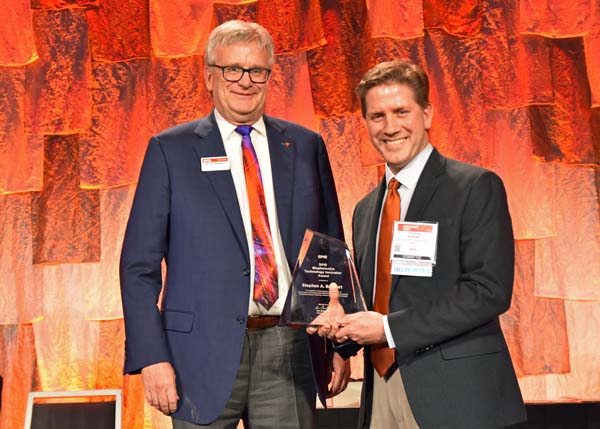The award is presented for extraordinary achievements in biophotonics technology development that show strong promise or potential impact in biology, medicine, and biomedical optics

SPIE President Jim Oschmann presents Stephen Boppart with the 2019 SPIE Biophotonics Technology Innovator Award
BELLINGHAM, Washington, USA and CARDIFF, UK - On Saturday, at the BiOS Hot Topics session during Photonics West in San Francisco, SPIE, the international society for optics photonics, honored Stephen Boppart with its 2019 Biophotonics Technology Innovator Award.
Stephen Boppart, director of the Center for Optical Molecular Imaging and head of the Biophotonics Imaging Laboratory at University of Illinois at Urbana-Champaign, was recognized for his "development of novel technology in computational optical coherence tomography and its application to basic and clinical sciences." The founder of no less than four biophotonic startup companies, Boppart also encourages colleagues and fellow research faculty to drive the translation of their work into the commercial sphere.
In 1998, while he was a grad student at MIT, Boppart was part of a team that co-founded LightLab Imaging, which pioneered commercialization of optical coherence tomography (OCT) for catheter-based medical imaging applications. His next company, Diagnostic Photonics, uses OCT during breast cancer surgery to assess tumor margins. PhotoniCare, winner of the 2018 SPIE Startup Challenge, uses OCT to detect ear infections in children by providing real-time visualization of the middle ear.
LiveBx, Boppart's fourth and latest startup, stands for "living biopsy," and focuses on nonlinear, label-free imaging technology for tissue samples that are kept alive for a few hours after biopsy. His team realized that surgeons and biomedical researchers expend a lot of effort to extract tissue for biopsies and diagnosis, but then immediately put the sample in formalin and kill it. Keeping the tissue alive with oxygen and nutrients would allow researchers to image the cellular and molecular dynamics of the sample, and identify and use new image-based biomarkers.
Boppart's contributions to the field of biophotonics are not limited to his successful startups. His lab has developed new applications for nonlinear imaging and OCT, including vibrational imaging and elastography, contributing to the imaging of neural morphology, gastrointestinal malignancies, embryonic morphology, and engineered tissues. His team developed interferometric synthetic aperture microscopy (ISAM) and computational adaptive optics (CAO), which use computational methods to improve the resolution and quality of OCT images. This contribution has been singled out by Boppart's colleagues as an impressive technical feat that will impact biomedical applications in the future.
An SPIE Fellow who has served on several of the Society's conference program committees including Coherence-Domain Methods and Optical Coherence Tomography in Biomedicine; Optics in Tissue Engineering & Regenerative Medicine; and Biomedical Applications of Light Scattering, Boppart is highly lauded by colleagues across his field. Adam Wax, professor and director of graduate studies in the Department of Biomedical Engineering at Duke University, who has known Boppart for nearly 20 years, is quick to note Boppart's highly impressive academic research metrics in terms of publication, funding, and citations. And, he adds, "his experience in translational research, from developing new techniques, to seeing their clinical applications, to their commercialization, has truly set him apart as an innovator."
About SPIE
SPIE is the international society for optics and photonics, an educational not-for-profit organization founded in 1955 to advance light-based science, engineering, and technology. The Society serves 257,000 constituents from 173 countries, offering conferences and their published proceedings, continuing education, books, journals, and the SPIE Digital Library. In 2018, SPIE provided more than $4 million in community support including scholarships and awards, outreach and advocacy programs, travel grants, public policy, and educational resources. www.spie.org.
________________________________________
Contact:
Daneet Steffens
Public Relations Manager
daneets@spie.org
+1 360 685 5478
@SPIEtweets